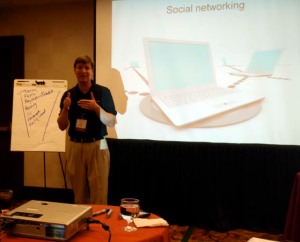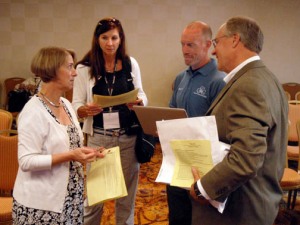Noel-Levitz Conference Debrief
Sitting in my hotel room with my bags packed and ready to head back to North Carolina, I have a few minutes to digest the varied issues that were addressed at this Noel-Levitz conference that dramatically impact educational institutions from every state in the country.
 The number one issue is the economic downturn and how it’s impacting educational institutions throughout America. I walk away from the conference more positive about this challenge than negative because of the way conference presenter’s framed it and turned it around to be an opportunity for positive change and growth rather than an insurmountable hurdle.
The number one issue is the economic downturn and how it’s impacting educational institutions throughout America. I walk away from the conference more positive about this challenge than negative because of the way conference presenter’s framed it and turned it around to be an opportunity for positive change and growth rather than an insurmountable hurdle.
I also feel good about the presentation Title III Project Director Don Staub and I gave the first morning of the conference. We had very positive feedback and participation from our audience. Sharing the strides we’ve made at Carteret Community College made me realize that our efforts are paying off and the grant has been a catalyst for changing the culture of the college for the better when it comes to technology, distance learning, outcomes and assessment of all we do.
Considering I was out of my element at a conference that concerned marketing and retention rather than distance learning, I was pleasantly surprised at the excellent quality of the presentations and how I learned no matter what area of education your in, whether that be faculty, staff and/or administration we are all facing the same challenges and grappling with rapidly changing instructional delivery technologies and student demographics that no longer fit the mold we as educators created decades ago.
and retention rather than distance learning, I was pleasantly surprised at the excellent quality of the presentations and how I learned no matter what area of education your in, whether that be faculty, staff and/or administration we are all facing the same challenges and grappling with rapidly changing instructional delivery technologies and student demographics that no longer fit the mold we as educators created decades ago.
One thing is certain. We can no longer conduct business the same way with the same outdated models. We have to be willing to completely and totally rethink how we offer our instructional services to our students. These are students that are very VERY different than the students that attended our colleges 10, 15, 20 years ago. They communicate differently, socialize differently, learn differently and think about their education and careers very differently, and this reality in itself demands that we rethink how we serve and teach them.
I for one am excited about the challenges ahead, however as I consider some strategies for overcoming these hurdles I think about the bureaucratic road blocks and archaic mindsets we must break through in order to seriously compete and grow in this ever changing, dynamic global economy, where students shop for the best services and colleges online and no longer have to attend the institution in their geographical region thanks to online education. That seems to be one of our biggest challenges as educational institutions. To change the culture and attitudes about education and how we conduct business – because it is no longer business as usual.
 Many colleges still use the outdated and archaic industrial revolution model to teach their students. This approach for the most part is no longer viable and one of the first things we must take a good hard look at when rethinking how we operate and deliver instruction. We should also take a hard look at the nine to five, Monday – Friday work week. Is this still viable? I walk away from this conference realizing that absolutely everything we do should be on the table for reevaluation. There should be no sacred cows during this process of self examination.
Many colleges still use the outdated and archaic industrial revolution model to teach their students. This approach for the most part is no longer viable and one of the first things we must take a good hard look at when rethinking how we operate and deliver instruction. We should also take a hard look at the nine to five, Monday – Friday work week. Is this still viable? I walk away from this conference realizing that absolutely everything we do should be on the table for reevaluation. There should be no sacred cows during this process of self examination.
We have an excellent opportunity to rethink how we operate, streamline, and begin retooling all aspects of our college services and instructional modalities. Unfortunately instructional technologies (and our students) are changing at a must faster rate than we can change so their must be a sense of urgency about our ability to compete and remain viable in this dynamically digital and wired world we find ourselves in.
We should be soul searching and asking ourselves some questions. How are we communicating to our students? How are we marketing to them? How are we delivering our services to them? Do we go to them or expect them to come to us. Is our web site visually dynamic and interactive? Are we exploring the potential of social networks as a way to be more proactive in meeting our students needs? There are many questions to ask and we may not have all the answers and solutions right away, BUT if we don’t start seriously asking these questions at our institutions we are going to (in the not to distant future) find ourselves losing touch with the very market that sustains us.




